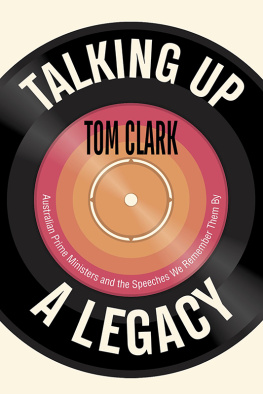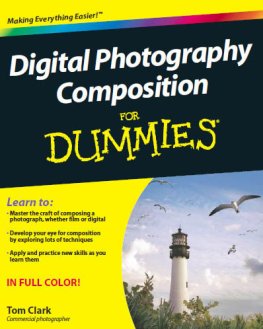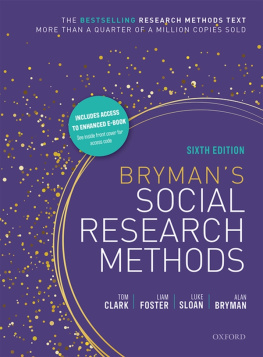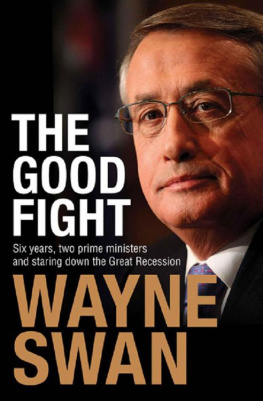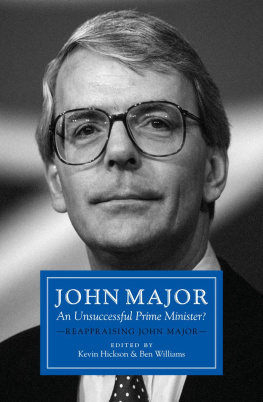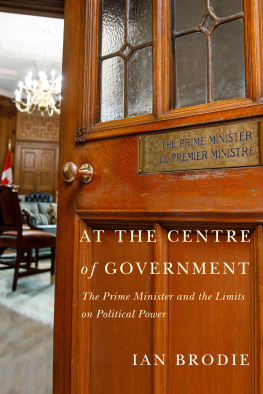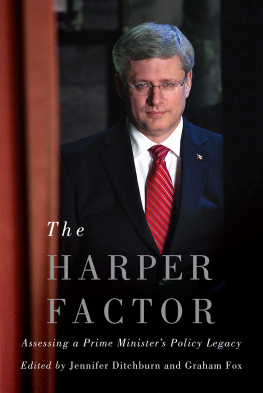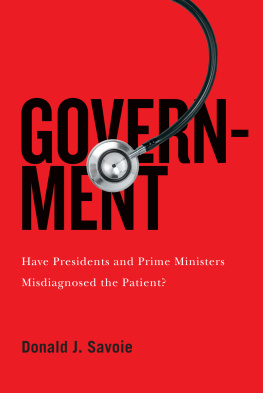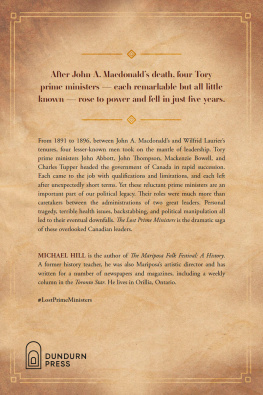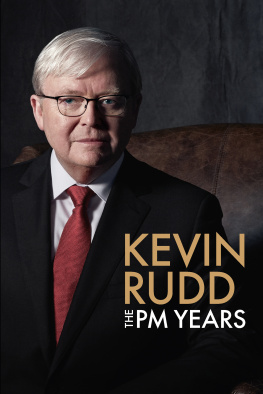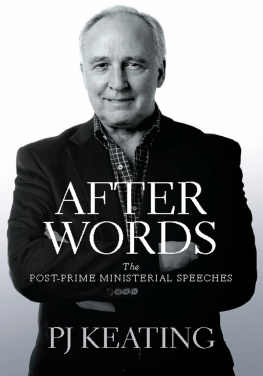Praise forTalking Up a Legacy
Prime ministers make countless speeches but only a handful truly shape our national debate and history. They provide a wonderful lens through which to explore the evolution of modern Australia.
Lindsay Tanner
We talk about the story of Australia, but rarely do we interrogate it as a form of literature. Yet what we know of our past is known through stories, and the stories that others tell about those stories. This book is unique in choosing quintessential speeches by, or about, the slate of prime ministers from Whitlam on, and analysing them as a form of poetry, so as to reach into not just the storytellers, but the substance of the world that birthed them. This gives an insight into contemporary Australia deeper than that of the policy-obsessed political scientist, or the insider-absorbed political journalist.
Graham Young,On Line Opinion
TOM CLARK is an Associate Professor in the First Year College at Victoria University, Melbourne. He is President of the Australasian Universities Language and Literature Association and Secretary-General of the International Federation for Modern Language and Literature. He is also Deputy Chair of the Victoria University Academic Board. Toms academic work combines an education in early English and Old Norse poetry with a professional background in speechwriting and policy advice to inform his teaching of rhetoric and public speaking. He is involved in various research projects looking at the poetic qualities of contemporary public language and is the author of Stay on Message: Poetry and Truthfulness in Political Speech (Australian Scholarly Publishing, 2012), OI: poewemz bii tom see (Cordite On Demand, 2004) and A Case for Irony in Beowulf, with Particular Reference to Its Epithets (Peter Lang, 2003).
TALKING UP A LEGACY
Australian Prime Ministers and the Speeches We Remember Them By
TOM CLARK

First published in 2019 by
UWA Publishing
Crawley, Western Australia 6009
www.uwap.uwa.edu.au
UWAP is an imprint of UWA Publishing,
a division of The University of Western Australia.

This book is copyright. Apart from any fair dealing for the purpose of private study, research, criticism or review, as permitted under the Copyright Act 1968, no part may be reproduced by any process without written permission. Enquiries should be made to the publisher.
Copyright Tom Clark 2019
The moral right of the author has been asserted.
ISBN: 978-1-76080-041-3 (pbk)
ISBN: 978-1-76080-090-1 (epub)
ISBN: 978-1-76080-091-8 (ePDF)

Cover design by Alissa Dinallo
Typeset by Lasertype
Printed by McPhersons Printing Group

Contents
Acknowledgements
This book has been some time in the growing. It feels like a culmination of every poem I have heard or read, every politician and political commentator I have paid attention to, every conversation I have enjoyed about poetry, politics or their combination in whatever form. I hope most of the interlocutors enjoyed those conversations, too. In any case, there are thousands who deserve credit for pushing me to explain myself.
Several kindnesses have been instrumental in making Talking Up a Legacy possible. Paul Keatings office supplied me with a facsimile of the script he used for his Redfern Park Speech, complete with his own handwritten mark-ups. Australian Parliament House supplied an image of Robert Hannafords portrait of Keating. Andy Dolphin supplied the caricature of Kevin Rudd. Andrew Fyfe supplied the caricature of Tony Abbott. DonkeyHotey supplied the caricature of Malcolm Turnbull. Newspix supplied an image of Dave Swifts photograph of Scott Morrison.
There have been important collaborators in the development as well. Terri-ann White, Kelly Somers, Katie Connolly and their colleagues at UWA Publishing have been constantly supportive, as well as suitably critical, while the ideas became a manuscript became proofs became a book.
Earlier versions of ideas expressed here have appeared in the Journal of Language, Literature and Culture, Overland, PRism and an edited collection published by Cambridge Scholars Publishing.
A great debt is to Meaghan Morris, whose Ecstasy and economics (a response to the then-ascendant Paul Keating) I took as a licence to work in earnest on the poetics of politics. Most of what I have published as an academic is somehow indebted to that essay. Words of direct, personal encouragement have undoubtedly sped this project along, too.
Another great debt is to Brendan Wynter, who read and commented on a draft of the manuscript: his reform legacy is major.
To be an academic and write a book is only bearable when the workplace is supportive and the work is manageable. For the last two years it has been my very good fortune to work in the First Year College at Victoria University, Melbourne, and to research with colleagues in VUs Institute for Sustainable Industries and Liveable Cities.
To Becky Batagol, and to our children, Blazey and Lev, there is also that very important debt to people who have encouraged the work and lived with the single-mindedness that has produced the work. I hope this book repays some of the pride you fire in me each day.
My greatest teacher, reader, critic and guide in all the work on Talking Up a Legacy has been Alison Clark. Prima inter poetas: I dedicate this book to you.
The legacy medium
When the government changes, the country changes, Paul Keating declared in 1996. It is a line that Australian journalists and Coalition politicians have quoted many times since. It reminds us that the outlook and actions of the government of the day have widespread ramifications in the lives of people on the ground. Not just in the policy reforms, as sweeping or superficial as they may be, but also in the attitudes that guide decisions people make and decisions made about people all over the country, all day and every day. Within the extraordinary complexity that a government for tens of millions of people must be, the leading indication of its values and of the strategic thrust of its actions is the behaviour of its leading official, the prime minister. He or she is the clearest and most observed example of what a government can or cannot, will or will not do.
This book takes a particular look at the years since 1991. That is, the period in which all of Australias living current and past prime ministers have served. Arguably, the global forces that have driven a sense of escalating challenge in the rise of widely accessible internet technologies, especially since the advent of the World Wide Web, and then intensely since the emergence of mobile data; the proliferation of media outlets, especially with the introduction of interactive online platforms and social media, combined with the concentration of media ownership. These forces have become impossible to ignore since 1991. They have radically recast the communities people inhabit, hence the governance we need, and hence also the political movements that seek to govern or at least to influence governments.
Next page
